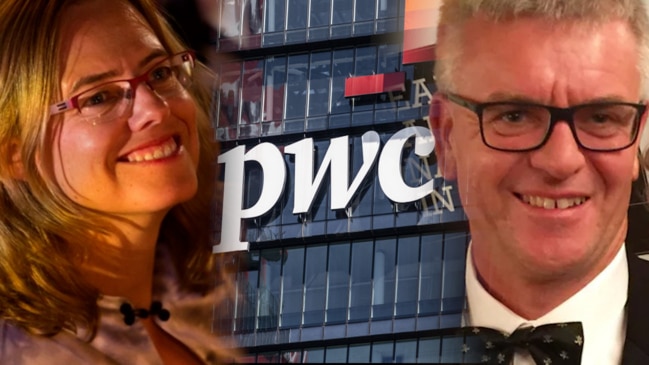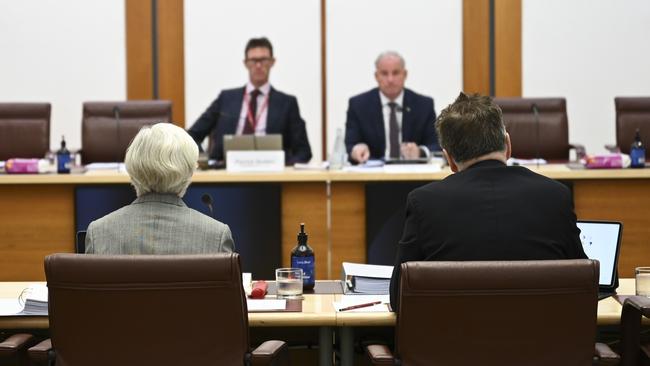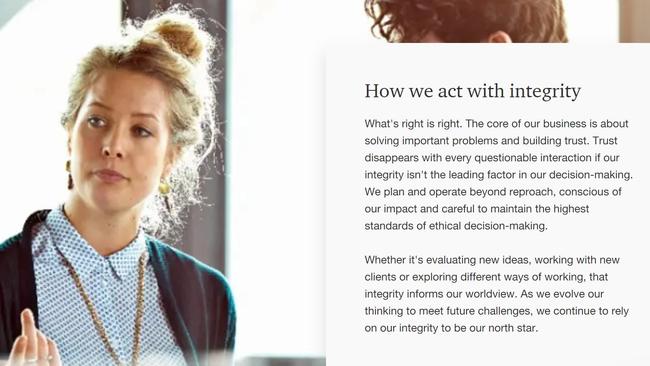PwC: A corporate giant on the brink and the ‘best graduate job going’ that’s now on the nose
Not too long ago, it was seen as the best graduate job going – a foot in the door that almost guaranteed a high-flying and well-paying career. That’s now all in tatters.

Careers
Don't miss out on the headlines from Careers. Followed categories will be added to My News.
When Jasmine* was suddenly struck down with a severe health issue that could’ve taken her life, the young woman’s first thoughts weren’t about family or friends.
It was all about work and how quickly she could get back to the office, even though she was in the intensive care ward of a hospital.
At that point, Jasmine was several months into a graduate role with one of Australia’s so-called ‘big four’ accounting and advisory firms.
She’d spent hundreds of hours of her final year of business school trying to land one of the coveted graduate positions offered by those four corporate giants – Deloitte, Ernst & Young, PwC, and KPMG.
Tens of thousands of other students from across the country wanted a spot too and after extensive assessments, testing and interviews, Jasmine was one of the lucky ones.
“The process involved in getting a grad position was so intense, but it was just a taste of things to come,” she told news.com.au.
Sixty-hour weeks were common. So too was extensive and exhausting travel. Graduates endured what experts describe as a military-style “tour of duty” to experience all parts of the consulting business.
They must be nimble, they must be quick on their feet, and they must learn quickly.
For all that, there’s a fairly modest salary on offer, in the grand scheme of things anyway – somewhere between $60,000 and $70,000 per year, depending on the firm.

“But I loved it,” Jasmine recalled. “I desperately wanted to succeed, and I was willing to do whatever it took.”
That included rushing back to work as soon as possible, even though she concedes in hindsight that she wasn’t ready.
Her managers said all the right things about supporting her return and accommodating her needs, but the first – and only – request she made about flexible arrangements went down like a lead balloon.
“I felt the atmosphere in the room change,” she said. “So, I didn’t ask for anything else.”
Jasmine no longer works for a big four. She’s now in a senior and well-paid position in the private sector and enjoys a work-life balance that her former colleagues would envy.
But she wouldn’t be where she is without having that big four name on her resume, she freely admits.
Years on, and the frenzy surrounding graduate roles at one of those elite firms seems a little muted in recent times, industry experts say.
The reason? Three infamous letters – an acronym that once commanded hushed respect, and idolisation among business school students, but which now carries a pungent stench.
From clout to ‘a cancer’
In May last year, scandal engulfed the mammoth operation of global powerhouse PwC and things haven’t quite been the same since.
In a nutshell, it emerged that while raking in billions of dollars doing work for the federal government, PwC had obtained and shared sensitive and secret information with its clients, for their financial benefit.

It was labelled by the government as a “deception and betrayal” and PwC was furiously described in parliament as a “cancer”, because it emerged that it wasn’t just one rogue staffer involved, but many.
There were calls for blood, some big heads rolled, and intense scrutiny was placed on the reliance of consulting firms by governments.
PwC was forced to offload its multibillion-dollar government consulting business for just $1 and lost several major clients, including Westpac after a 20-year association.
Hundreds of staff were let go at the back-end of 2023 as a result.
This week, the embattled firm announced it was slashing another 366 jobs as part of widespread restructuring in the wake of the scandal.
“I think it must be pretty confusing for our final year students who are about to go through the whole recruitment process,” Dr Rosemary Sainty, a lecturer at UTS Business School and a member of its board, said.
“It’s a machine. It’s a big, big thing. Graduate recruiters, of which the big four accounting firms are highly significant, come onto campuses and spruik their opportunities with students.
“For final year students, it must be pretty difficult for them to work out what the right thing is to do here.”

Recruiters who spoke to news.com.au on background said the feedback from those in the market for work at all levels is that the big four are on the nose.
And one higher education pundit told news.com.au that interest from high school graduates in accounting and business degrees took a hit this year.
It’s unclear how big a role the PwC scandal played, but young people place a great deal of emphasis on ethics, Dr Sainty said.
Purpose matters
Reflecting on her graduate journey now, knowing what she does about PwC and considering its tattered reputation, Jasmine is conflicted about how she’d approach the company.
“On the one hand, you’d be happy to get an opportunity with a big four, but on the other …” she said, trailing off.
“I’m not so sure. I think it’d be tough to walk in there with your head held high. I’d probably favour one of the others if I was going through it all again.”
The current generation of business school students are no less ambitious than those who’ve come before them. If anything, it’s a more competitive landscaped now than ever.
“But it’s well understood now that grads are looking for a role in an organisation that has purpose, meaning positive social impact,” Dr Sainty said.
“And that’s becoming more and more important. So that’s an issue for PwC.”
The PwC scandal is something that’s “on the students’ radars” and being discussed, and the case is already in learning materials, she said.
“It’s actually quite a good case study on trust and normalised bad behaviour. Students are learning about it now already.
“We’ve had Enron and we’ve had Arthur Anderson, and now students are able to look at PwC and see the fallout.”

There will likely be students who carefully consider whether PwC’s values align with theirs, Dr Simon Longstaff, executive director of The Ethics institute and an adjunct professor at UNSW Business School, said.
“The large consulting firms, the big ones that grew out of the accounting profession, had always relied upon a professional obligation to put the public interest first, to put it ahead of self-interest,” Dr Longstaff said.
Of course, they existed to make money, but there was an air of responsibility that staff took pride in – a kind of ‘greater good’ attached.
“See, the accounting part of these firms, those that do the auditing and that kind of business, are clearly run by professionals in the old sense of the word, who are bound by those obligations,” Dr Longstaff said.
But consulting isn’t a profession – it’s a career.
“It doesn’t recognise anywhere that it has this overarching obligation. It’s far more likely to see itself as belonging to the market.
“And that’s a very uneasy thing to have within the same skin of an organisation, and it really then depends on who’s in charge.”
That clash between the two – the profession and the career – is probably where PwC ran into trouble, doing things that once would’ve been unthinkable, all for the sake of money.
There will be some students who are uncomfortable by being in that kind of world, he said.
“Do they want to have that sense of overarching ethical commitments? Do they want the respect that’s typically accorded by society all the other things that come from it?”

Or is it really all about making a heap of money and living a fast-paced high life that many consultants enjoy?
“I think in terms of the appeal of these organisations to graduates, it depends on those fundamental questions. I mean, sectors like investment banking don’t have any trouble getting people to work with them.
“But working in a profession has a value which isn’t just about money. It’s about identity and the kind of contribution you make to society.
“And I think there’ll always be people who want to do that. Where the flow goes will depend upon what these firms decide they want to be.”
‘Their worth is their people’
There’s a reason the big four spend so much time, money and effort on running months-long recruitment “machines” each year.
And it’s less to do with nurturing the next generation of professionals and more about long-term growth.
Christopher Wright is a professor of organisational studies at the University of Sydney Business School said the major firms operate on a variation of a “up-or-out model”.
“It’s constant performance appraisals, six monthly or whatever it is, and [junior staff] continually being assessed about their skills and their ability to work with clients,” Dr Wright explained.
“All the time, the partners and others are assessing them and saying, ‘Well, has this person got what it takes to make partner eventually?’
“They make decisions about them along the way as they’re climbing the ladder, and if they feel that they’ve not really got what it takes, they’ll sort of massage them out of the consultancy and typically place them into a client company somewhere.”

Again, this isn’t out of the goodness of their heart, wanting to ensure the worker they’ve just gotten rid of lands on their feet.
“It’s part of a whole alumni network that then feeds back to the consultancy in terms of future work.”
So, they shuffle them out of the firm and into a top corporation, where they can stay happy and keep funnelling business back to where they got their start.
“It’s a great business model,” Dr Wright said.
For the big four firms, Dr Sainty said “their worth is in the people that they’ve got”.
“That’s why recruiting the brightest young minds is actually really critical to their business model. So, potentially, [the PwC scandal] has a long-term play – a long tail in terms of the reputational hit that they’ll take.
“It’s hard to tell how much that translates into graduate program [uptake].”

While there’s no doubt PwC “has taken a big hit” and the whole sector is under a very bright spotlight, Dr Wright suspects they won’t have trouble filling graduate roles.
“The firms have cultivated a strong brand image. They’re seen as bringing in the best and brightest graduates from top business schools. They’re seen as elite organisations.
“I guess because I’ve been studying the history of consulting for a long, long time, I’m not convinced that this latest round of scandals is going to be sufficient to puncture that image.
Teflon-coated giants
The PwC scandal has rocked the industry and cost the company – and its competitors – money.
But Dr Wright isn’t sure there will be long-term damage, given that it’s hardly the first time there’s been a stink surrounding the sector.
“These firms have been copping a lot of criticism, not just here but around the world. And this is not new.
“I mean, there’s been over time waves of criticism of management consultancies and their influence. There’s a long sort of history of critique of consulting, but what is surprising is how they bounce back.
“We’ve seen examples of this in the past. In the UK, for instance, lots of criticism over the years about the enormous amounts of money spent by the public sector on big four consulting, and that’s just gone on.
“I mean, it’s almost like they’re Teflon coated.”

He believes firms like PwC and its rivals are “so embedded in the structure” of the private and public sectors that “they’re almost too big to fail”.
But size and power is not always a guarantee of security, Dr Sainty pointed out.
“I would imagine that at the global level for PwC, after what happened to Arthur Anderson, that such a huge entity can actually collapse, they would be feeling very nervous.”
Change is necessary – and demanded
The PwC scandal is still playing out and the damage could take years to recover from, but Dr Longstaff hopes it’s seen as an opportunity, rather than a threat, for all the companies in the space.
“What you’ve seen in Australia over more than a decade now is a series of institutions being revealed as having fallen short of the ideals they proclaimed for themselves and the expectations of the community.
“The industry probably needs to ask itself, is it still a profession? Does it want to be a profession? Does it want the privileges that come with being a profession?
“When you roll with the good times to the point that you start to look away, because it’s in no one’s immediate interest to challenge the prevailing norm, what happens is that you find otherwise good people end up doing bad things, not because they deliberately chose to do so, but they don’t see the nature of what they do.”

Part of the Ethics Centre work is strengthening the notion of what it calls ‘ethical infrastructure’ in society.
“So, you need physical infrastructure like roads and rail, you need technical infrastructure like the internet, but you also need ethical infrastructure, which is those trusted institutions that help markets work as they’re supposed to work, or politics to deliver as it’s supposed to, all these things there.
“And if that’s eroded, whether it’s on a national scale, or whether it’s on an individual scale within an organisation like a PwC, then once it’s broken, or eroded, or corrupted, whichever way you want to think of it, then it’s pretty certain then that things will go awry.
“But that it should become eroded, or broken, or corrupted is never inevitable.”
* Real name withheld by request
Originally published as PwC: A corporate giant on the brink and the ‘best graduate job going’ that’s now on the nose





